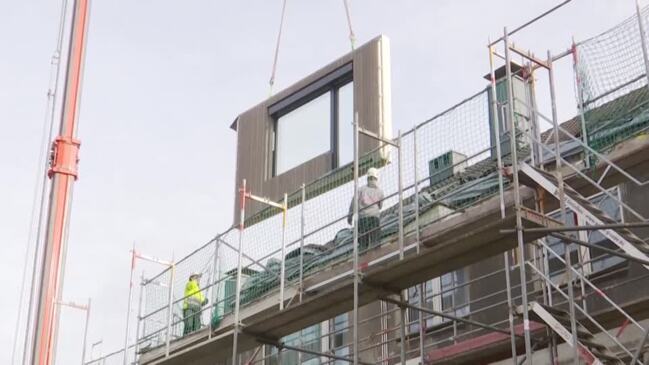A Berlin-based startup plans to retrofit apartment buildings in the German city of Bochum with a customized wooden “second skin” to make them more energy efficient.
The Ecoworks project reflects a growing demand for environmentally friendly and energy-saving renovations in response to Germany’s energy crisis, which has resulted in an increase in heating costs.
Prior to the crisis, landlords saw energy-efficient renovations as a nice-to-have rather than a necessity in a sector that missed its CO2 targets in Germany last year.
The second skin will increase energy efficiency
This is changing as a result of rising energy prices and a new law that divides a CO2 levy between tenants and landlords based on building efficiency.
Approximately 70% to 80% of energy costs are saved in this property, according to Emanuel Heisenberg, CEO of Ecoworks, referring to the Bochum apartment buildings.
Buildings account for 35% of total energy consumption in Germany, Europe’s largest economy, where nearly a third of its 19.25 million residential buildings have the lowest and next-lowest energy efficiency rankings, according to a February study by the GdW housing and real estate association.
Interest rate increases, rising energy and raw material prices, and fluctuating subsidies are all limiting investment, according to Andreas Schichel, a GdW spokesperson.
Landlords are also hesitant to take on such projects due to a lack of construction workers and lengthy renovation processes.
Prefabricated building elements are the solution to the problem
Heisenberg’s company is attempting to overcome these challenges by designing pre-fabricated climate-neutral facades using a technology that requires roughly a third of the time and half the workforce.
Typically, such projects last 6 to 9 months. It takes 15 weeks in our case, according to Heisenberg.
The company claims that its renovations are CO2-neutral because it uses cellulose for insulation and wood for the outer facades.
You can’t demolish all the houses and rebuild them with cement and steel. It is simply far in excess of our carbon budget. As a result, Heisenberg believes that building with renewable materials such as wood is essential.

